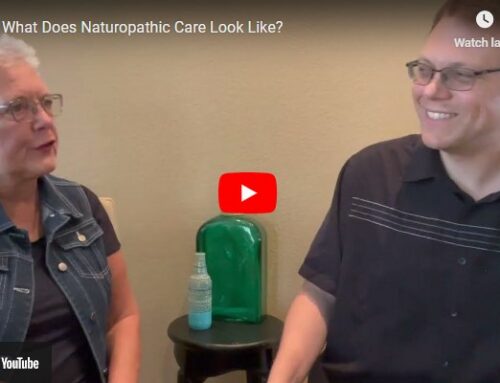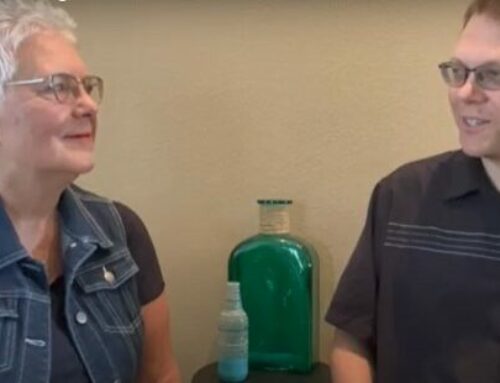Watch Part 1: How Integrative Care Can Benefit You
Watch Part 3: What Does Naturopathic Care Look Like?
Transcript:
As patients, we come to the doctor’s office and people have a great deal of faith in their doctors. So they say, “I’m going to leave myself in the hands of the professional, they know what they’re doing.” But part of integrative medicine is also empowering the patient. So, now, when a patient shows up to their doctor are there some questions that they can have prepared ahead of time for themselves that are useful, in general, so they can feel that they are part of their own healing process?
Yes, and most of them do when they come to my office. They have their symptomology, how long it’s been going on, all kind of weird symptoms that are happening, they bring a list of their medications, and all that. So the kind of people that I attract or that are attracted to naturopathic medicine, are usually very proactive. And then, of course, I will always ask, “Are there any other questions that you have?” I will give education but I always say tell me, what kind of questions do you have? And just listening in to what their concerns are. Because at a mental level it just calms their nervous system if they know that they have been heard.
That’s a big thing, is listening. I always tell patients that come in that we are partners in this. I am not just going to tell you what to do, tell you what to do. I need to hear what your body is telling you. And in that way, what you tell me, I can help you even better. So I need you. You’re my partner and I will give you all the knowledge and experience that I have learned over the years, but you’re going to tell me what your body is saying. And at that point, people become more and more–they listen to their body, they become more and more self-confident, and more involved in their care. And that is where true healing really occurs. Because the person that comes in–that’s the body that needs and wants to be healed. So I have to depend upon that individual to give me that information.
So being proactive is a key to this type of care.
Yes, it’s a key to the type of care because, you know, we’re not with the patient 24/7 but when things pop up I always tell them to contact us so that we can look at–it’s not so much that maybe this or that is not working, but we may have to decrease it a little or increase it.
So part of this is not just proactivity, but self-responsibility in the patient. So it means that the patient may have to make some very conscious decisions about the way that they are living. They are going to have to take responsibility for themselves.
Yes, absolutely. It is–I call it a paradigm shift. It is an awakening. It is an understanding that “I am responsible for my body.” And when people go to a physician and they have a lot of patients coming in and, you know, we can’t remember everything. Be responsible for what you know about your body and relate it to the physician so it can be part of looking at the root cause of things. So, yes, absolutely. And with responsibility comes, actually, much self-confidence because–and that’s the empowerment. It’s taking the responsibility, they see the results of the action, and they become more confident in their care and make judgments about certain things that they’re going through and can implement it themselves. And that’s the self-empowerment. And that’s what I get excited about, being in medicine for forty-plus years, is wow–these people are becoming knowledgeable. And they’re becoming more confident in themselves, and how to take care of themselves, and what to do, and so instead of seeing a patient every few months, my goal is to see them knowledgeable, self-empowered, where I just see them once a year for an annual check up. And that might be it, you know.
So, instead as having a “subscription,” almost, to medical care your hope is that they become empowered enough so that they don’t have to keep constantly visiting the doctor’s office to constantly try to get someone else to fix them.
That’s it.
You empower them so that they can take care of their own health.
Correct. Correct. And mentally it’s disempowering to keep going over and over and over for “fix, change, heal, improve me.” It’s okay when you need help, you know–reach out for it. But when you’re doing it on a regular basis, you have to look at the whole story. And that’s where, again, education, education and empowerment, empowerment comes in. And when people feel self-confident that brings them a long way in taking care of themselves and knowing what to do. And so, yeah, just not going to the doctor except once a year to get your annual is self-empowering.
So there are people who have been taken care of in traditional ways, in other ways, and it doesn’t seem to be working for them and they’ve tried everything. And they say, well I have gone to everyone, it just can’t be helped, I’m just going to be in this perpetual state of someone patching me up for the rest of my life. It can be difficult for a patient to get the kind of self-confidence that they need in order to make almost a leap of faith to try something different like integrative care. How can we make sure that we can have that confidence? What advice would you give to people who are not sure that they should try something new? How can they build up the bravery needed to try a new form of medical care?
Well, I don’t try to convince anybody about anything. Some people are where they are and they choose not to go any further in looking at the root cause, and that’s their choice. And they may choose not to be involved in their care–they want, you know, whatever–a fix-it. And that’s okay. I respect you, but it’s not a place where I work from or naturopaths work from. And so those people–you used the word “bravery”–those people that do come in, that have tried different places and everything and are getting more medication without getting to the root cause of the problem, the first thing I do is congratulate them. And say, thank you for being an inspiration with your courage to do this. Because a lot of times they feel like they’ve almost given up–it’s the last place. But, they had the courage to come in and look at, be open to, something else that may help them. And not that conventional medicine is not helping. It’s just that they want to get to the root cause so maybe they won’t have to take so many medications, you know. And, yeah, some people are where they’re at. I don’t have to convince anybody. They may not want to be convinced. But those that do come in and are just kind of dipping their big toe in the water, I say, the first thing–courage. They had the courage to come in.
Part 1: How Integrative Care Can Benefit You
Part 3: What Does Naturopathic Care Look Like?





